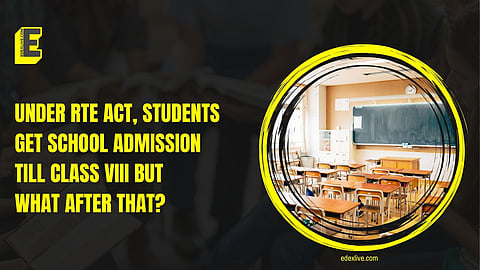

S Sekar, a mechanic from Pammal in the district, is faced with a difficult task. He has to convince his daughter, who had been studying at a private school under the Right to Education (RTE) Act, to get her transferred to a government school for Class IX. Last week, he paid the pending dues at the private school and obtained her transfer certificate. However, his daughter is devastated.
"I earn Rs 400 per day. In 2014, I enrolled my daughter in a private school after hearing from my neighbours about admissions under the RTE Act. Since there were not many takers for RTE seats then, my daughter got admission easily. Now, she doesn't want to leave the school, but I can't afford the full fees in the private school. She is scared of shifting herself to a Tamil medium school. Studies apart, she is also leaving all her friends and has to shift to a new environment," said Sekar with regret, stated a report by The New Indian Express.
Under the RTE Act, 25% of seats in private schools are reserved for students from disadvantaged groups or weaker sections, with the government covering the cost of their education until Class VIII.
The story is similar for most students admitted to private schools under the Act. Parents from disadvantaged backgrounds are either scrambling for money to ensure their children continue at the same school or trying to convince their wards to shift to a nearby government school, with a heavy heart.
The admissions under the RTE Act in private schools in the state started in the academic year 2013-14, and more than 40,000 students were enrolled under it. The admissions nearly doubled to more than 86,000 students in 2014-15 and these students are now shifting from Class VIII to Class IX.
From now on, 86,000 students transitioning from Class VIII to Class IX every year will face this problem. "I enrolled my son in a private school only because of the Act, and thought it was a good opportunity for him at low cost. He is now questioning why I am talking about shifting his school even though he has been scoring good marks. I am thinking of borrowing money to ensure he continues in the same school," said N Srinivasan, an autorickshaw driver.
He has been paying around Rs 10,000 to Rs 15,000 as fees for his son in a private school despite studying under the RTE Act.
Activists say this might lead to an increase in dropouts and will also affect the children psychologically.
"The government introduced reservation under the Act and provided an opportunity for poor students to study in private schools. Now, they must ensure the students travel the full distance and complete their school education in the same schools. It should consider bearing the costs for another four years till Class XII," said K Sridhar of Tamil Nadu Students Parents Welfare Association.
Meanwhile, members of associations of private schools said they have not received any instructions from the government, and they have no other option but to demand fees from parents of students from Class IX.
A Palanisamy, director of private schools, declined to comment on the issue.
